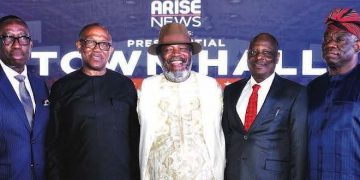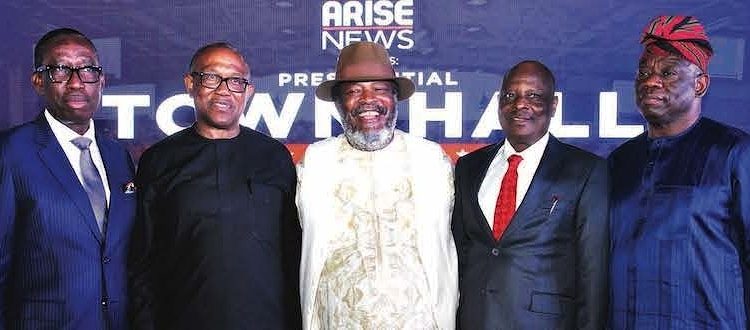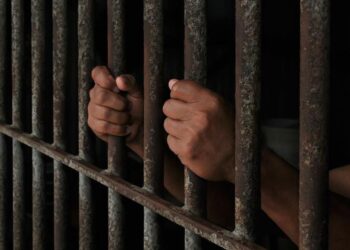By John Ikani
A Town Hall meeting organised by Arise News Channel in partnership with a group, Centre for Democracy and Development (CDD) in Abuja on Sunday, saw frontline presidential candidates in the 2023 general election gave a preview of their plans for the country if elected president respectively.
The town hall series focused on two issues – security and the economy, as candidates laid out agendas for a better Nigeria.
CDD and Arise TV had invited Bola Tinubu of the All Progressives Congress (APC), Atiku Abubakar of the Peoples Democratic Party (PDP), Peter Obi of the Labour Party (LP) and Rabiu Kwankwaso of the New Nigeria Peoples Party (NNPP) for the debate.
According to the organisers, the four candidates were selected based on the performance of their parties in an online survey by the organisers during which all the 18 political parties were listed in alphabetical order.
However, the vice-presidential candidate of the PDP, Ifeanyi Okowa represented Atiku, while Tinubu neither appeared nor sent a representative.
Consequently, Kola Abiola of the Peoples Redemption Party (PRP) was later added to the list of candidates to participate in the event.
What LP’s Peter Obi said
Presidential candidate of Labour Party lamented the level of poverty in the north, saying it was unacceptable, given the amount of arable lands available for agricultural purposes in the region, even as he insisted on the removal of fuel subsidy if he is elected president next year.
“How do I tackle the issue of IPOB, Boko Haram and all agitations? I have said it repeatedly; I will dialogue with every agitator. There is nothing wrong with agitation. I will consult. Governance and democracy is about consensus. I will consult, I will dialogue, I will meet everybody. Dialogue is normal, agitations is normal. So, we will deal with everybody. We will make sure we sit down and talk and resolve issues amicably,” he said.
Obi went on to express disappointment over the level of poverty in the country, especially, in northern Nigeria, where he said leaders had failed to leverage the huge arable lands in the region to create employments. “Today, in Nigeria, you have 35 per cent unemployment with our youth. With your youths, who are in productive age, you have 60 per cent youth unemployed. You can’t have that, and won’t have crisis. That’s where the guns are domiciled. “So, you replace that with job, you replace it with employment, you invest in your micro small businesses, where these youths are domiciled by supporting them, pulling them out of poverty.
“The whole of Nigeria, in terms of physical assets, is those uncultivated lands in the north. You can’t have that huge land and we have the level of poverty that we are experiencing in the north. Niger State, has eight or seven local governments that are occupied by bandits. It is unacceptable,” he said. Obi, who earlier alleged that people in government were involved in oil theft, said his government would remove subsidy to develop other critical sectors of the economy.
“The quantity of consumption is unacceptable and you can compare with countries like Pakistan with about 215,000,000 to 220,000,000; they have more roads than we have and they have more vehicles than we have but their consumption is below ours. That shows that something is wrong. It’s criminality that we need to deal with immediately.“What Will I do? We will remove subsidy. Use the resources efficiently and support those, who are and set up refineries and channel the rest of the resources to other critical sectors,” he said.
What the PDP Presidential Candidate said
Presidential candidate of the PDP, Atiku, who was represented by his running mate, Okowa, said, the PDP would ensure a private sector-driven economy and would handle insecurity, by creating a state police that was fully equipped.
“We need to emphasise coordinated intelligence gathering and sharing. We need more boots on the ground to address insecurity in Nigeria. We need to evolve policing in Nigeria to ensure that people, who have a better understanding of their areas, know how to secure their areas. One centralised police force is unable to meet the demands that we have.
“We need more boots on the ground. We need adequate welfare to ensure that our security agencies are better-taken care of. We also need to address unemployment — otherwise more young people will be drawn to contribute to the insecurity.“State police is necessary, because the police in the neighbourhood knows the nooks and crannies and know the environment and with that knowledge, the state police apparatus would be able to tackle the insecurity wherever it rears its head,” he said. He explained that though kinetic force could be used where necessary, there would still be dialogue, adding that adequate employment should be provided for the teeming unemployed youth.
On the economy, Okowa said of the Atiku/Okowa presidency: “From 1999 to 2007, we knew where President Obasanjo and Vice President Atiku, met the country and where they left it. Because of them, we were able to pay back a lot of our debt and we had debt forgiveness.“In Delta State, we used to have agitations in oil-producing communities. But now, we have partnered in these communities to create jobs, create a new class of entrepreneurs and show people that we care about development.” “The right path is to use government resources to develop entrepreneurs, make people’s lives easier, and grow the economy so that people will live in better conditions,” he said.
On subsidy, he said it was a scam, explaining that it was impossible for Nigeria to consume 60 million barrels of fuel, let alone 90 million barrel. To address the scam, he called for quick completion of the Dangote Refinery in Lagos and the introduction of the operations of modular refineries in the country. Okowa described crude oil theft as organised crime, which must be addressed through the use of technology and oil surveillance equipment.
He equally advocated a production economy as against consumption economy, explaining that it was the only away to tackle the effect of dollar on the naira, stressing that it was alarming that the official dollar rate would be N430, whereas the parallel market rate would be above N800.“An Atiku/Okowa presidency will improve the export economy and less on import,” he said.
What NNPP’s Rabiu Kwankwaso said
Presidential candidate of NNPP, Rabiu Kwankwaso, who said the current number of military officials was grossly inadequate, promised that he has made adequate arrangement to increase the number of military officers from two hundred and fifty thousand to one million men for the Army, Air Force and Navy. He stressed that he was going to take over every square metre of the country and pledged to increase policemen from two hundred and thirty thousand to two million.
“We will be willing to sit down with everyone with grudges in any part of the country to dialogue and at the end of the day, anyone, who decides to do otherwise, definitely, the law will take its course,” he said. Further on security, Kwankwaso said, if the government was doing the right thing, many people would have put down their arms, adding that those who did not want to do that, it was the responsibility of the government to ensure peace as people went about their legitimate businesses not minding religion and ethnicity
On the economy, Kwankwaso said there are so many things that are intertwined, the issue of exchange, corruption, oil theft, we are supposed to give out 2.2 million going by the OPEC arrangement but the record is less than that, so we have to do whatever it takes to stop stealing.“It is very critical to us that we work on how to stop stealing of oil and other assets owned by the nation. The issue of subsidy, we are aware that there is a lot of corruption in the field and the first area of attack on subsidy is the issue of corruption. Subsidy over all doesn’t do any good to anybody but at the same time, we are concerned with the welfare of Nigerians.”
He also revealed that he never borrowed in the eight years that he governed Kano State and that he left so much money in account of the electricity generation, adding that he left over 43 million dollars.He said, “We inherited a budget, which recurrent was 70 per cent, capital 30 per cent but by the time I was going in 2015, we reversed that. I believe that in this country, we have enough money, enough resources and all we need is leadership that will ensure that every kobo goes into the right place.
What PRP’s Kola Abiola Said
Presidential candidate of the PRP, Kola Abiola, who was big on security, said there was a need to address the security architecture of the country in order to tackle the hydra-headed security problem confronting the country.
He decried the fact that the national security committee of the country had allegedly not sat since 1999, in spite of the deteriorating security situation in the country.
Speaking on economy, Abiola said if elected, his government would stop subsidising consumption, but added that his government would rather subsidise mortgage, even as he condemned the fixed exchange rate that was twice the rate of the parallel market.
“Forex is a big problem. You can have the biggest of foreign exchange in Nigeria, which is the oil and could go up and down from time to time. Like during the COVID-19, it was at the lowest but your exchange rate remained fixed. “There’s something wrong with that. You cannot have an exchange that is twice if not more the black, gray or white market or whatever you want to call it. There’s something very wrong with that mechanism. Something has to be done to deal with that,” he said.
On the issue of energy and power, he said his administration would look at the potential of each region with the intent of coming up with a solution of energy mix, explaining that areas with hydro potentials and capabilities would be encouraged to develop along that line, while areas with solar and renewable energy would also be supported.
He added that the country would continue to depend on oil as long as it was still available but would have to devise a means of adding value to the nation’s in such a way that it would bring down the cost of doing business in Nigeria.




































